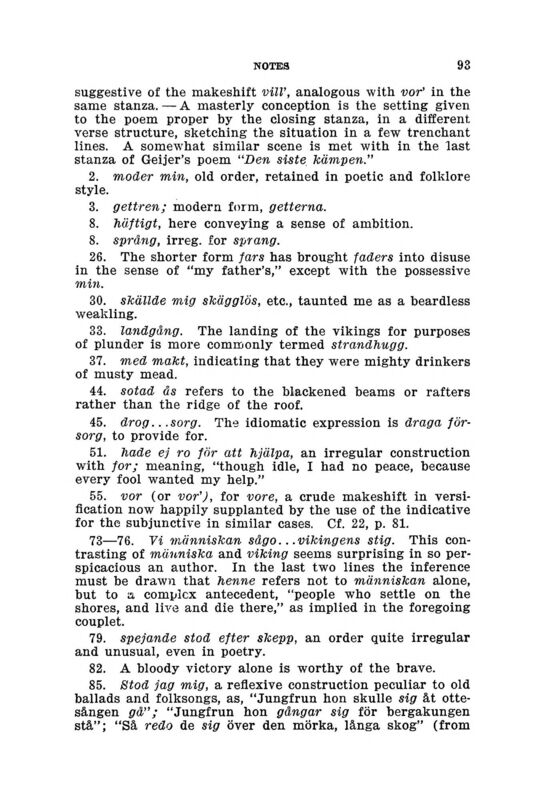
Full resolution (JPEG) - On this page / på denna sida - Sidor ...

<< prev. page << föreg. sida << >> nästa sida >> next page >>
Below is the raw OCR text
from the above scanned image.
Do you see an error? Proofread the page now!
Här nedan syns maskintolkade texten från faksimilbilden ovan.
Ser du något fel? Korrekturläs sidan nu!
This page has never been proofread. / Denna sida har aldrig korrekturlästs.
NOTES 93
suggestive of the makeshift vill’, analogous with vor” in the
same stanza. — A masterly conception is the setting given
to the poem proper by the closing stanza, in a different
verse structure, sketching the situation in a few trenchant
lines. A somewhat similar scene is met with in the last
stanza of Geijer’s poem "Den siste kämpen.”
2. moder min, old order, retained in poetic and folklore
style. |
3. gettren; modern form, getterna.
8. häftigt, here conveying a sense of ambition.
8. språng, irreg. for sprang.
26. The shorter form fars has brought faders into disuse
in the sense of "my father’s,” except with the possessive
min.
30. skällde mig skägglös, etc., taunted me as a beardless
weakling.
33. landgång. ’The landing of the vikings for purposes
of plunder is more commonly termed strandhugg.
37. med makt, indicating that they were mighty drinkers
of musty mead.
44. sotad ås refers to the blackened beams or rafters
rather than the ridge of the roof.
45. drog...sorg. The idiomatic expression is draga
försorg, to provide for.
51. hade ej ro för att hjälpa, an irregular construction
with for; meaning, "though idle, I had no peace, because
every fool wanted my help.”
55. vor (or vor’), for vore, a crude makeshift in
versification now happily supplanted by the use of the indicative
for the subjunctive in similar cases. DCf. 22, p. 81.
73—76. Vi människan sågo...vikingens stig. This
contrasting of människa and viking seems surprising in so
perspicacious an author. In the last two lines the inference
must be drawn that henne refers not to människan alone,
but to 2 compiex antecedent, "people who settle on the
shores, and live and die there,” as implied in the foregoing
couplet.
79. spejande stod efter skepp, an order quite irregular
and unusual, even in poetry.
82. A bloody victory alone is worthy of the brave.
85. Stod jag mig, a reflexive construction peculiar to old
ballads and folksongs, as, "Jungfrun hon skulle sig åt
ottesången gå”; "Jungfrun hon gångar sig för bergakungen
stå”; "Så redo de sig över den mörka, långa skog” (from
<< prev. page << föreg. sida << >> nästa sida >> next page >>